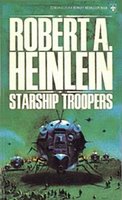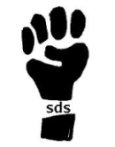Robert Heinlein...fascist?

This particular paperback edition of Starship Troopers was my introduction to Robert Heinlein in 1969, when I was in the ninth grade. Plotless as it is, the book has remained one of my favorites, and without apologies, I’ve reread this military sci-fi classic many times.
Frequently, people have argued with me that Troopers is fascist. Well, I won’t deny that many of its ideas are, to a radical libertarian like myself, problematic. But fascist? Nah. In fact, in an excellent retrospective review of the novel posted just a few days ago, John C. Wright addresses that charge rather well. Here’s a taste:
“I must pause to say a word, or, rather, clear my bowels, to answer the notion that this book is fascistic, or that Heinlein was a fascist for writing it. The charge is too stupid to merit an answer. My whole rebuttal to this consists of a rude noise from my buttocks, and in so doing, I have equaled or excelled the intellectual endeavor of those who bring this charge. This tale takes place in the mere opposite of a fascistic background: a democracy where anyone of any race, Jew or German, may vote, once he serves his time. The free enterprise in the system is not dependent on citizenship, nor is there any evidence of state control of the economy, state-welfare, collective ownership of factories, or any other aspect of fascism, naziism, or totalitarianism. Oh? Are you puzzled that I am mentioning state control of race relations and economics when discussing fascism? My comments are only meant for those who know what the word ‘fascism’ actually means, not people (and you know who you are) who merely use it as a swear word to describe political opinions you have not the civility to rebut honestly.”













11 Comments:
I think one reason people call it fascist is that they (rightly) associate fascism with the privileging of military over commercial values. Of course there's more to fascism than that. But Heinlein's idea that military service counts as an endeavour that makes one worthy of citizenship, while commercial activity does not, not only fits in with that aspect of fascist values, but also gives the military (or ex-military) class total political control over the commercial class. (Interestingly similar to Plato's Republic in that respect -- ironically, since in _Starship Troopers_ Heinlein slams Plato's Republic as an "anthill society.")
Of course in Heinlein's society the military class follows a policy of laissez-faire toward comemrce -- and that's certainly a big difference from fascism. But nothing in the political structure guarantees this; it just counts on the military class being nice. I reckon that any real-life society that made military service a precondition for political power would end up with fascist results pretty quickly.
Plus of course in Heinlein's system (as in Plato's) it's not currently-in-combat military but retired military that make decisions about war, so they can still externalize the costs.
On the other hand, if you actually talk to ex-military folks they're actually much more laissez-faire and anti-militaristic than the general population seems to be. Most likely because they've seen the downside up close.
Currently-serving military folks tend to blind themselves to these downsides in order to be able to function in their job.
(those that don't tend to become "troublemakers" of one sort or another)
Thought you and your readers might be interested in an article I just stumbled across:
http://www.highplainsmessenger.com/2006/06/the_master_and_the_mountain_sc.php "THE MASTER AND THE MOUNTAIN: Science Fiction writer Robert A. Heinlein in Colorado Springs" by Eva Syrovy, June 16, 2006.
In case the URL got truncated, here's it again in cut-and-paste format, as well as linked from my name:
http://www.highplainsmessenger.com/
2006/06/
the_master_and_the_mountain_sc.php
I think one reason people call it fascist is that they (rightly) associate fascism with the privileging of military over commercial values.
The world of ST doesn't privilege the military over the commercial. Heinlein was writing just after WW2, where a large percentage of the population had to serve in the military. These same folks, when that service was over, entered the commercial arena and could be just as "anti-military" when it served their purposes as any dove. Having several relatives who served in that war I know that a couple of years of military service doesn't turn people into fascist automatons, as you seem to imply.
It's difficult to imagine how a society could conduct the form of Total War depicted in the book without some form of state control over the economy. The economy of the US during WWII was heavily regulated by the War Production Board, and towards the end over 40% of the US GNP was devoted to military production. Economic regulation was essential to prevent a meltdown. The absence of any real consideration of the economy is merely an example of the shallowness of Heinlein's whole premise.
It's clear (to anyone who doesn't talk out of his ass, as John C. Wright does) that the society in ST has renounced the concept of universal rights and is sliding rapidly into fascism. The value of the book lies in showing how alluring fascist ideals can be to those without the insight to realise their danger
Here's a quote from his book, To Sail Beyond the Sunset
Somehow, the masochistic revisionists have turned the War of 1898 into a case of imperialistic aggression by the United States. How an imperialist war could result in the freeing of Cuba and of the Philipines is never made clear. But revisionism always starts with the assumption that the United States is the villain.
As I recall, the Filipinos enthusiastically greeted their "liberation" by forming citizen's militias and being slaughtered by the hundreds of thousands. Damned if that doesn't sound familiar... say Vietstaniraq?
I had never heard of the public's "right to know," a right that cannot be found in the Constitution but was sacrosanct in the second half of the twentieth century.
A theme of military triumphalism seems to permeate all his works; even when totally eschew to the story he is weaving. He's not only a fascist, he's a hamfisted one.
For all of those who are unaware... only about 5% of voters got their ability to vote through the military; the remainder got their vote through civil service (ranging from cops to miners, depending on the skill sets of individuals).
So much useful data for everyone!
I think that this post is the best that i have read.
Post a Comment
<< Home